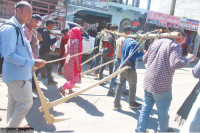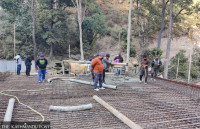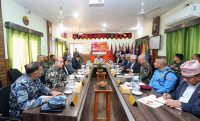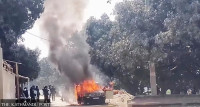National
Eminent Persons’ Group report continues to gather dust
The report recommends a revision to the 1950 treaty between Nepal and India and regulation of the border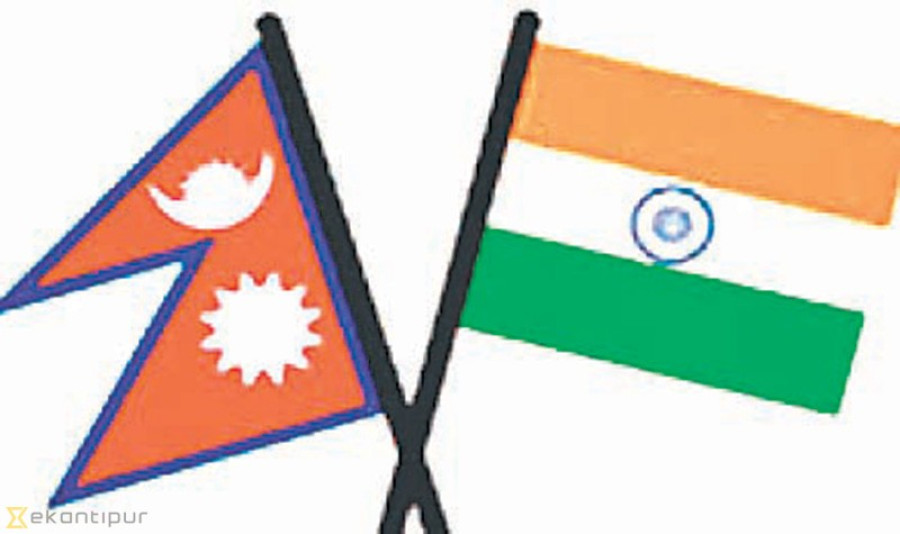
Anil Giri & Suresh Raj Neupane
A year ago, the Eminent Persons’ Group on Nepal-India relations prepared its joint report, charting out a future course for bilateral ties. But as of now, the report remains unimplemented, gathering dust in the annals of Kathmandu and New Delhi.
While the KP Sharma Oli administration has prioritised execution of the report, the Indian side has yet to receive the report due to Indian Prime Minister Narendra Modi’s busy schedule. Among other issues, the report suggests that both the governments replace the 1950 Treaty of Peace and Friendship, and also regulate the open Nepal-India border.
A panel of eight members from Nepal and India from diverse backgrounds had prepared the Eminent Persons’ Group (EPG) report exactly a year ago. While the Indian side was led by former chief minister of Uttarakhand Bhagat Singh Koshiyari, the Nepali team was led by former foreign minister Bhekh Bahadur Thapa.
“We were told that the report will be received after the Indian elections, but we are still waiting for a date,” said Thapa.
During a press briefing at India’s Ministry of External Affairs on Thursday, spokesperson Ravish Kumar could not confirm when the Indian Prime Minister would receive the report.
“The EPG has yet to submit its report to the Government of India and Government of Nepal. The report will be given due consideration by both sides once it is submitted,” Kumar said in the weekly press briefing.
The ninth EPG meeting, which concluded in Kathmandu last year, had agreed to replace the 1950 Treaty with a new one, regulate the Nepal-India border by asking citizens to show identity cards while crossing over to either side, and jointly tackle challenges in areas of combating terrorism, extremism, and all kinds of trafficking.
Upon the completion of the report, the eight-member panel had agreed to submit it to Indian Prime Minister Modi first and later to Prime Minister KP Sharma Oli. But the report remains stalled, as New Delhi is displeased with some of the panel’s recommendations, according to Indian policy experts.
“The EPG was formed to settle differences between Nepal and India, but it has become a showpiece. I seriously doubt whether the report will be implemented,” said SD Muni, a Nepal expert in New Delhi. “I do not think either side is serious about implementation.”
According to Muni, some issues are difficult for Nepal while others are difficult for India.
“The EPG was created at a time when ties between Nepal and India were at a low. Now that relations between Nepal and India are very much on the right track, so both sides do not need its implementation,” he said.
However, both Thapa and Koshiyari are confident that the EPG report will soon be received by both prime ministers.
“The report is important to forge better ties between the two countires,” Koshiyari told the Post. “The report will be made public once both the prime ministers receive it.”
The report’s recommendations also concern trade, commerce, water resources, people-to-people contact and cultural ties, said Nepali members of the EPG.
One EPG member said they had sought to define bilateral relations with the next generation in mind. On the 1950 Treaty, which Nepal considers unequal, both sides have suggested replacing it with revisions to Articles 2, 5, 6 and 7. On the issue of national treatment for citizens of the other country, both sides have agreed to consider the nations’ sizes of geography and population.




 9.17°C Kathmandu
9.17°C Kathmandu

